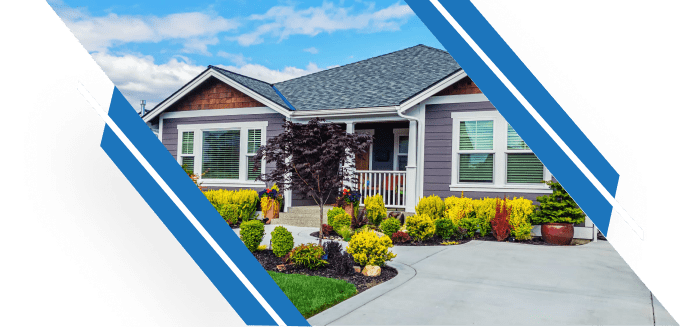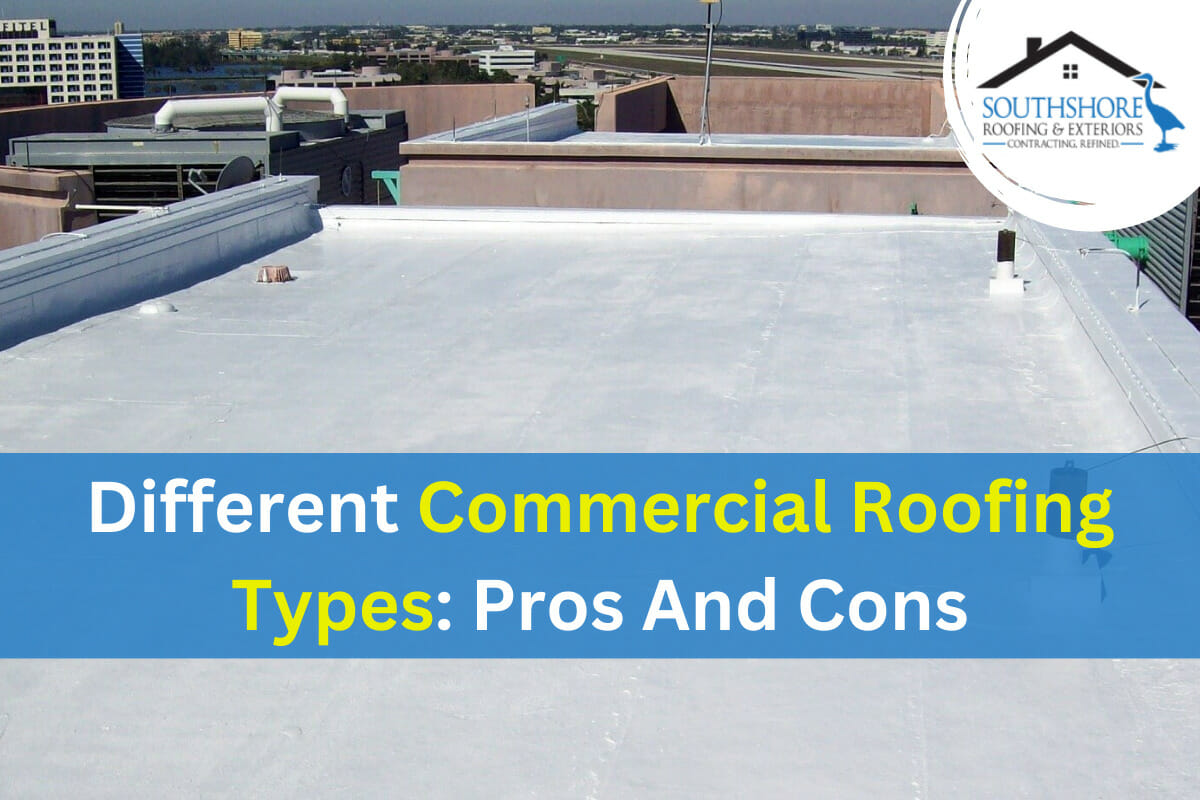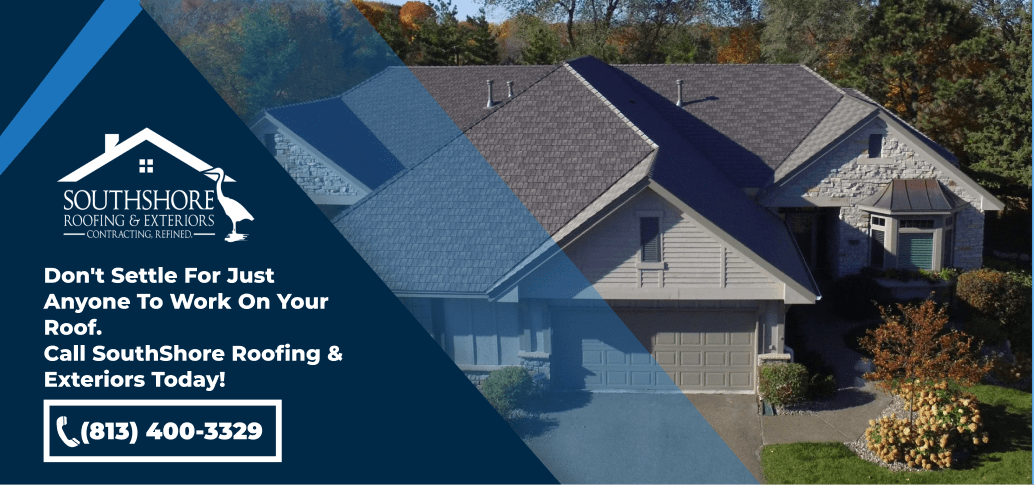As a commercial property owner, I understand the importance of having a durable and reliable roofing system. A well-maintained roof not only protects my investment but also provides comfort and safety to those who use the facilities of the building and are working there to make a living.
However, with so many different commercial roofing types available, it can be overwhelming to decide which one is best for a business. If you are also looking to install or replace your roof and going through the same process, you are in the right place.
In this article, I will explore some of the most common types of commercial roofing systems and their pros and cons. By better understanding each material’s strengths and weaknesses, I hope to help fellow property owners like you make an informed decision when it comes to selecting the right roofing solution.
So whether you’re in need of a completely new roof installation or are just looking to upgrade your current system, read on to learn about the various options available in today’s market.
#1 Built-Up Roofing (BUR)
Built-up roofing (BUR) is one of the oldest and most reliable roofing systems available today.
With its multiple layers and tar-coated surface, a BUR is like a sturdy fortress protecting your commercial building from harsh elements.
It consists of several layers of felt or fiberglass that are saturated with hot asphalt, then topped with a layer of gravel or mineral granules, (hence their other name, tar and gravel roofs). As with any roofing system, it’s important to weigh the pros and cons before making a decision to ensure that you choose the best option for your specific needs.
Pros Of A Built Up Roof
Here are some of the reasons why you may choose this commercial roofing material.
- One of the main advantages of a BUR is its durability. This roofing system can withstand heavy foot traffic, extreme weather conditions, and even fire.
- The multiple layers provide added protection against leaks and punctures, making it an excellent choice for flat or low-sloped roofs.
Cons Of A Built Up Roofing System
There are also some disadvantages to consider when choosing a BUR for your commercial building.
- The installation process can be messy and time-consuming as it involves heating up large quantities of asphalt on-site.
- Additionally, the weight of this roofing system can put stress on the structure below, so it may not be suitable for older buildings or those in need of structural reinforcement.
Overall, a BUR remains a popular choice for commercial buildings with durable nature, however, there are some other options too.

#2 Modified Bitumen Roofing
Modified bitumen roofing is a popular choice amongst contractors due to its durability and resistance to extreme weather conditions. This type of roofing is made from asphalt, which is modified with either atactic polypropylene (APP mod bit) or styrene-butadiene-styrene (SBS), both of them synthetic chemical compounds known for strength and resistance. These modifications improve the flexibility and strength of the material, making it ideal for use in areas with high foot traffic or frequent exposure to harsh elements.
Pros Of A Modified Bitumen Roof
- One of the main advantages of a modified bitumen roof is its ability to resist damage caused by UV rays, hail, wind, and rain.
- It also has a longer lifespan compared to traditional asphalt roofing systems, lasting around 20 to 25 years on average.
- Additionally, you can install a modified bitumen roof using various methods such as hot-mopped or cold-applied adhesives, torch-down applications, self-adhered sheets, or mechanically fastened systems.
- This makes it an adaptable option for different projects.
Cons Of A Modified Bitumen Roof
However, there are some downsides to modified bitumen roofs that should also be considered. Let us look at some of them:
- This type of roofing can be prone to punctures if not properly maintained or installed correctly.
- It may also develop cracks over time due to thermal expansion and contraction caused by temperature changes.
Nevertheless, proper installation techniques and regular maintenance can help prevent these issues and extend the life of a modified bitumen roof system
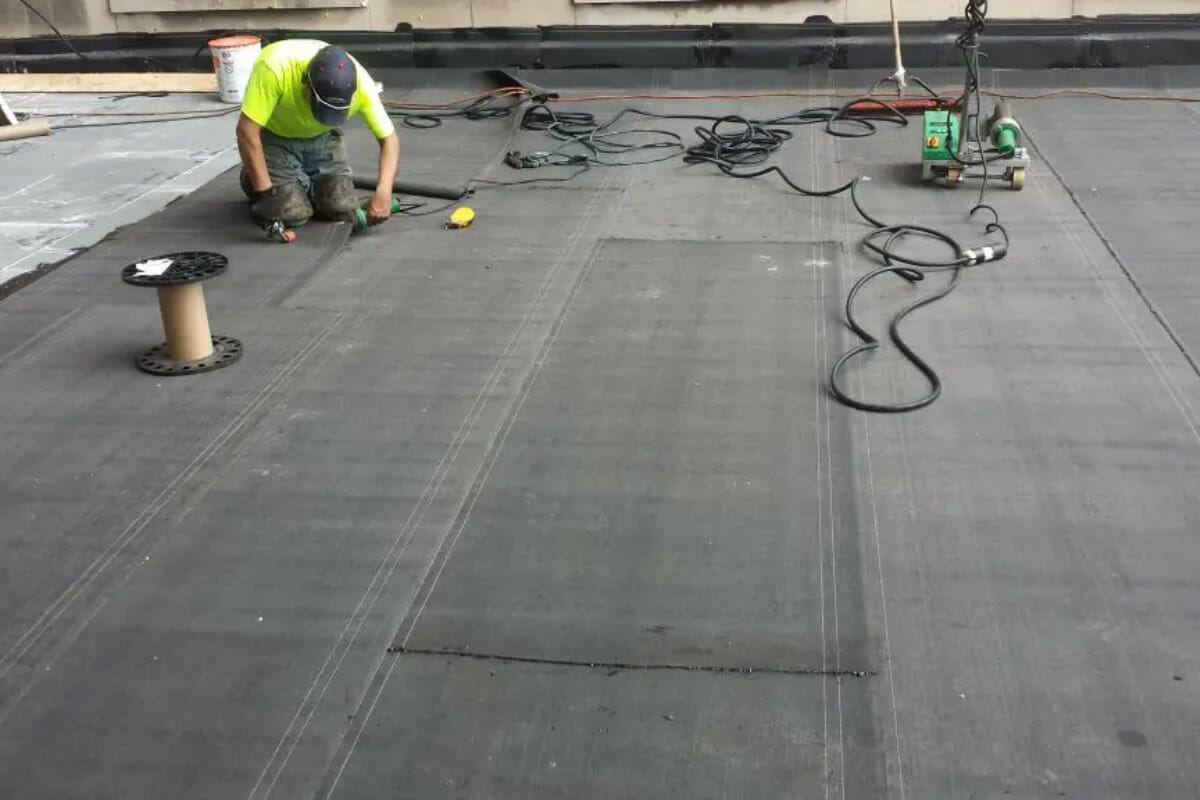
#3 EPDM Roofing
EPDM roofing is simply the best option for anyone who wants a roof that will last a long time and never require any maintenance! This type of roofing material has been around since the 1960s, and it’s still a popular choice today.
EPDM roofs are made from synthetic rubber, this is why they are also known as rubber roofing systems. The presence of synthetic rubbers and polymers such as propylene makes them extremely durable and resistant to damage from environmental factors and weather conditions like UV rays, wind, hail, and heavy rain.
Pros Of An EPDM Roof
For a commercial roofing type to be so popular, there have to be certain reasons. Here are some of the advantages of an EPDM roofing system:
- One of the major advantages of EPDM roofing is its low cost. Compared to other commercial roofing types like TPO and PVC, EPDM is significantly less expensive.
- It’s also easy to install, which means that you don’t have to spend a lot of money on labor costs.
- Additionally, because it’s weather and puncture resistant, you won’t have to worry about replacing your roof for many years.
Cons Of An EPDM Roof
Though EPDM is arguably one of the best commercial roofing materials out there, it is not free from imperfections. Let us look at some of them:
- For one thing, it doesn’t offer very good insulation properties.
- EPDM roofing material is predominantly available in black, which can increase the temperature of your building. This can pose a problem, especially within cities like Tampa.
- While EPDM roofs are relatively low-maintenance compared to other types of roofs like metal, they do require occasional cleaning in order to prevent debris buildup and maintain their appearance.
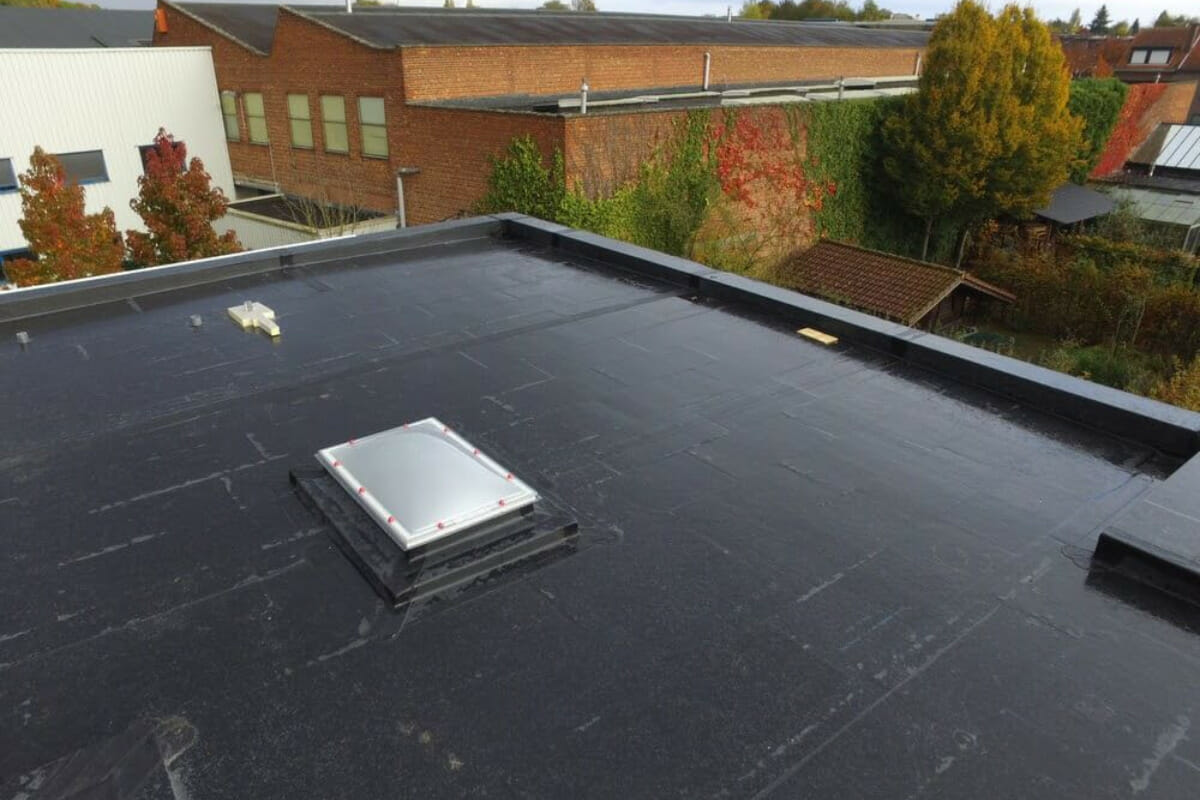
#4 TPO Roofing
If you’re looking for commercial flat roofs that’ll make your building look sleek and modern, you might want to consider TPO roofing. TPO is short for thermoplastic olefin, a single-ply membrane roofing system that’s become more popular in recent years due to its energy efficiency and premium design.
TPO roofs are made from a blend of polypropylene and ethylene-propylene rubber, which gives them their flexibility.
Pros Of TPO Roofs
- One of the biggest advantages of TPO roofing is its energy efficiency. The white or light-colored surface reflects sunlight, reducing heat absorption and transfer into a building.
- The reflective nature of TPO can result in significant cost savings on cooling bills during the hot summer months, which is extremely helpful in Florida.
- Additionally, TPO roofs are highly resistant to UV radiation, ozone exposure, and chemical damage, making them ideal for areas with harsh weather conditions.
Cons Of TPO Roofs
However, there are some cons to consider when it comes to selecting TPO for commercial properties. Let us take a look at them:
- One limitation is that it may not be as durable as other commercial roofing materials like PVC or EPDM.
- While they do have good resistance to chemicals and punctures, they may not last as long under extreme weather conditions such as hailstorms or heavy snowfall.
- Some contractors have reported issues with seam failure or shrinkage over time if proper installation techniques aren’t followed closely.
Overall, TPO roofing can be an excellent choice for those looking for an efficient commercial flat roofing option. Its energy-saving benefits and easy installation make it appealing to many business owners looking to upgrade their roofs.
However, since the material is relatively new it’s even more important to work with roofing professionals in Tampa who have experience installing this type of material to ensure optimal performance and longevity over time.
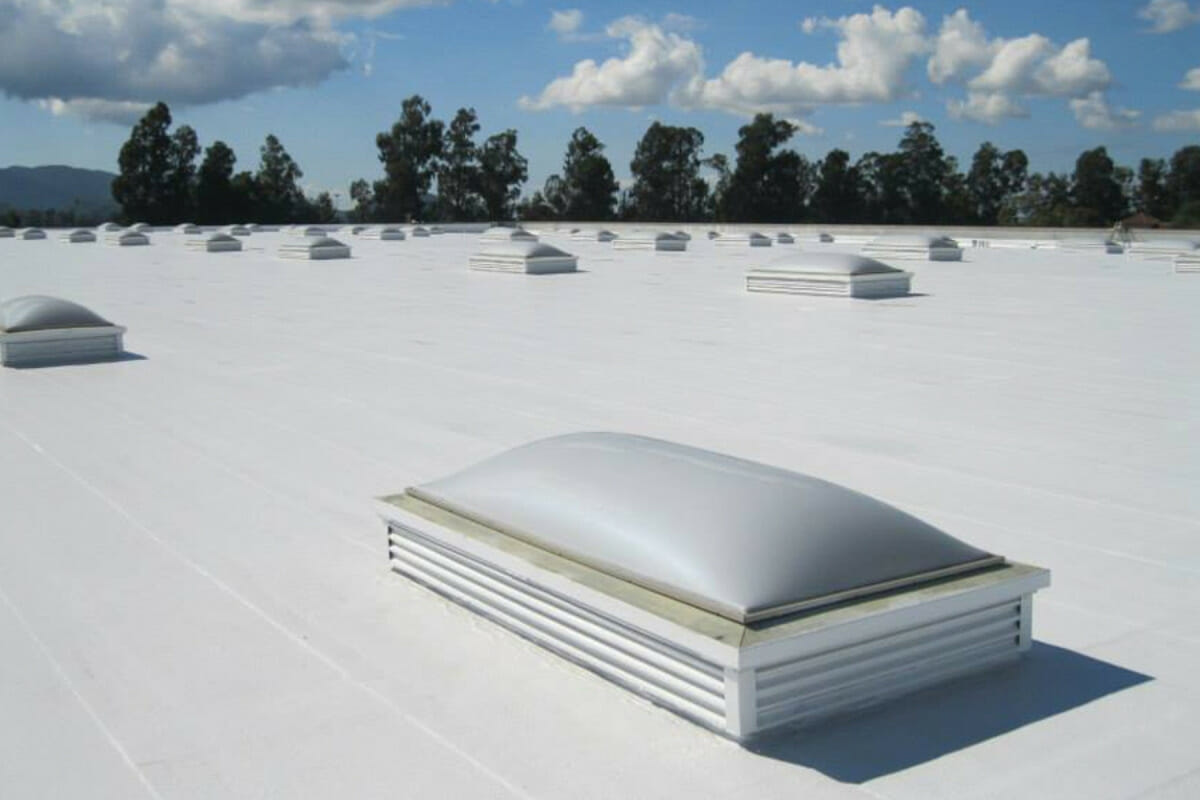
#4 Metal Roofing Systems
Metal roofing is a popular choice for commercial roofing systems known for its durability and long lifespan. This type of roofing is made up of metal panels or shingles, which can be made from various materials such as aluminum, copper, zinc, and steel. Be it a typical commercial building with a flat roof, or one with a pitched roof, you will find metal roofs everywhere.
Here are some pros and cons to consider when thinking about installing a metal roof on your commercial property:
Pros Of A Metal Roofing System
- A metal roof can last up to 50 years or more with proper maintenance, which is more than the majority of commercial roofing systems.
- Metal roofs reflect sunlight, reducing the amount of heat that enters a building. This can result in lower energy bills during the hot summer months.
- These require minimal maintenance compared to other types of commercial roofing. Therefore, it can save you time and money in the long run.
Cons Of A Metal Roofing System
- There are some cost issues. Metal roofing tends to be more expensive than other types of commercial roofing.
- Metal roofs can be noisy. Rain and hail can be louder on a metal roof compared to other flat roofing materials.
- While metal roofing may have a higher upfront cost compared to other options, it’s important to consider the long-term benefits such as durability and energy efficiency.
Also Read: Top 7 Metal Roofing Manufacturers

#5 Asphalt Shingle Roofing
Moving on from metal roofing, let’s now talk about asphalt shingles. Now you may be thinking, what are asphalt shingles doing on a list of commercial roofing types? Well, though most commercial buildings have flat roofs, there are some businesses that have pitched roofs. On these buildings, you can consider installing asphalt shingles, even for a commercial space.
As a roofing material, asphalt shingles are widely used on residential roofs and commercial buildings due to their affordability and durability. Compared to other roofing materials, asphalt shingles are relatively easy to install and require minimal maintenance.
Pros Of Asphalt Shingle Roofing
- In terms of pros and cons, one advantage of using asphalt shingles is their versatility. They come in various colors and styles.
- Additionally, asphalt shingles have good fire resistance compared to other roofing materials such as wood or rubber.
- Asphalt shingles are one of the most affordable roofing materials. Therefore this material is perfect if you have just started your business and are on a budget.
Cons Of Asphalt Shingle Roofing
There are also some drawbacks to using asphalt shingles. Here are some of the following:
- Asphalt shingles can only be installed on a pitched roof, which is not as common for commercial properties
- One issue is that they tend to wear out faster than other types of roofing materials. This means that building owners may need to replace or repair them more frequently than other roofs if they want them to last longer.
- Another disadvantage is that they aren’t as eco-friendly as other options since they’re made from petroleum-based products.
Overall, while there are some downsides to using asphalt shingles as a commercial roofing material, their affordability and versatility make them an excellent option for many building owners. With proper installation and care, they can provide reliable protection against the elements at an affordable cost.
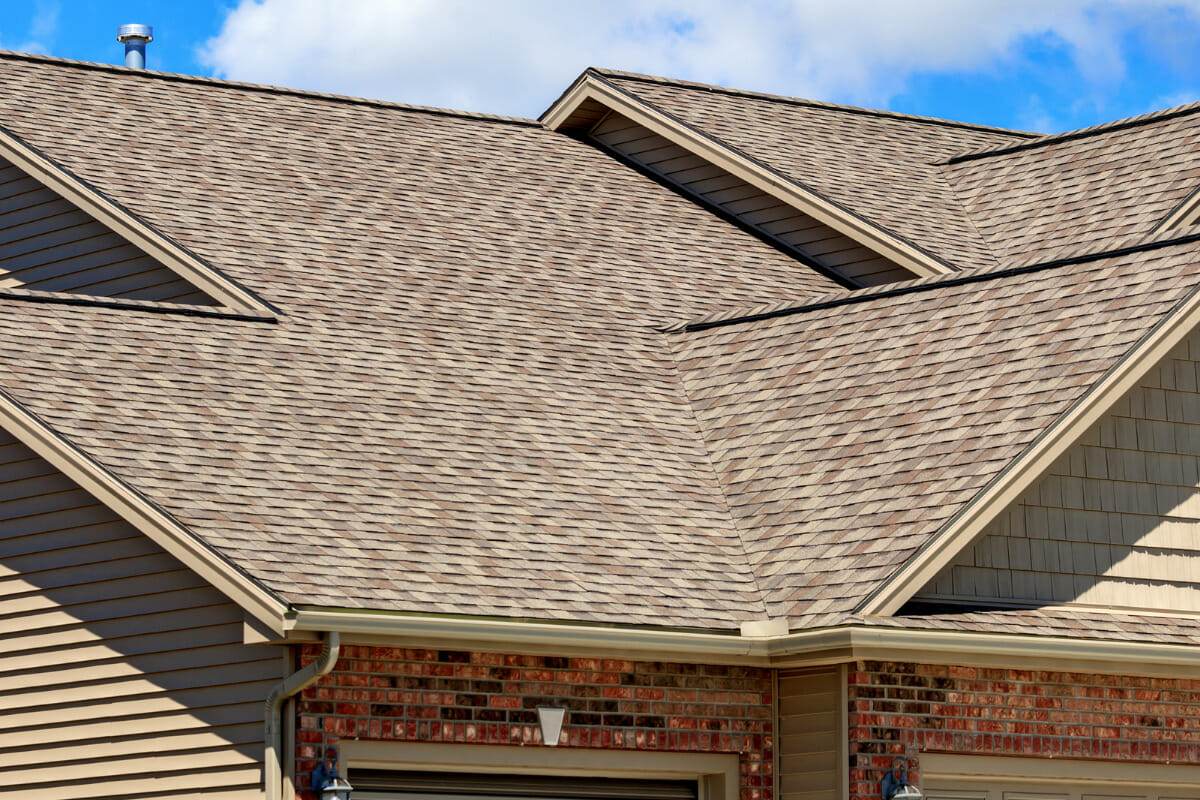
#6 Green Roofs
You might be surprised to learn that there’s a commercial roofing type available that not only provides protection for your building but also has environmental benefits. These are known as green roofs.
These roofs are essentially gardens on top of a building, offering numerous advantages over traditional roofing options.
Pros Of Green Roofing Systems
- Green roofs help to reduce the urban heat island effect by absorbing sunlight and reducing the amount of heat radiated back into the environment.
- They promote biodiversity by providing habitats for plants and animals in an otherwise concrete-dominated urban landscape.
- These commercial flat roof materials can help to improve air quality by capturing pollutants and reducing carbon dioxide levels.
- They provide insulation, helping to regulate indoor temperatures and reducing energy consumption for heating and cooling.
Cons Of Green Roofing Systems
While green roofs offer numerous benefits, it’s essential to consider potential drawbacks before making your decision. Here are some of the limitations of these commercial roof types:
- The installation cost can be significantly higher than traditional types of commercial roofing systems, due in part to the weight of the additional materials required.
- It’s important to ensure that your building’s structure is able to support the added weight before installing a green roof.
- Additionally, maintenance costs can be higher due to the need for regular watering, fertilizing, and pruning of plants on the roof.
Overall, if you’re looking for a sustainable roofing option with unique environmental benefits, a green roof may be worth considering.
While there are some challenges involved in installing it on your new commercial roof, these roofs offer significant advantages over traditional options.
As with any major investment in your property, it’s important to carefully weigh all factors before making a decision on installing a green roof.

#7 PVC Roofing
PVC roofing, with its flexibility and durability, has emerged as a popular commercial roof type for environmentally-conscious building owners. This roofing material is made of synthetic plastic polymer, which makes it resistant to moisture, punctures, and chemicals. It has a low-maintenance requirement and can last up to 20 years or more. PVC roofing is also energy-efficient since it reflects sunlight instead of absorbing it.
Pros Of PVC Roofing
- This material can be installed quickly using various methods such as mechanically attached, fully adhered, or ballasted.
- These options provide different levels of wind uplift resistance and insulation values depending on the needs of the building owner.
- PVC roofing can also be customized in terms of color and texture to match the design requirements of the building.
Cons Of PVC Roofing
As captivating as PVC roofing may seem, it’s crucial to uncover its hidden drawbacks before deciding on a PVC roof.
- One major concern is its environmental impact during production and disposal.
- The manufacturing process releases toxic pollutants that may harm human health and contribute to climate change.
- Additionally, once the roof reaches its end-of-life stage, it may not be recyclable due to additives like plasticizers that make it difficult to break down materials into reusable components.
Due to this, proper disposal measures should be taken when replacing old PVC roofs to minimize their overall impact on the environment.
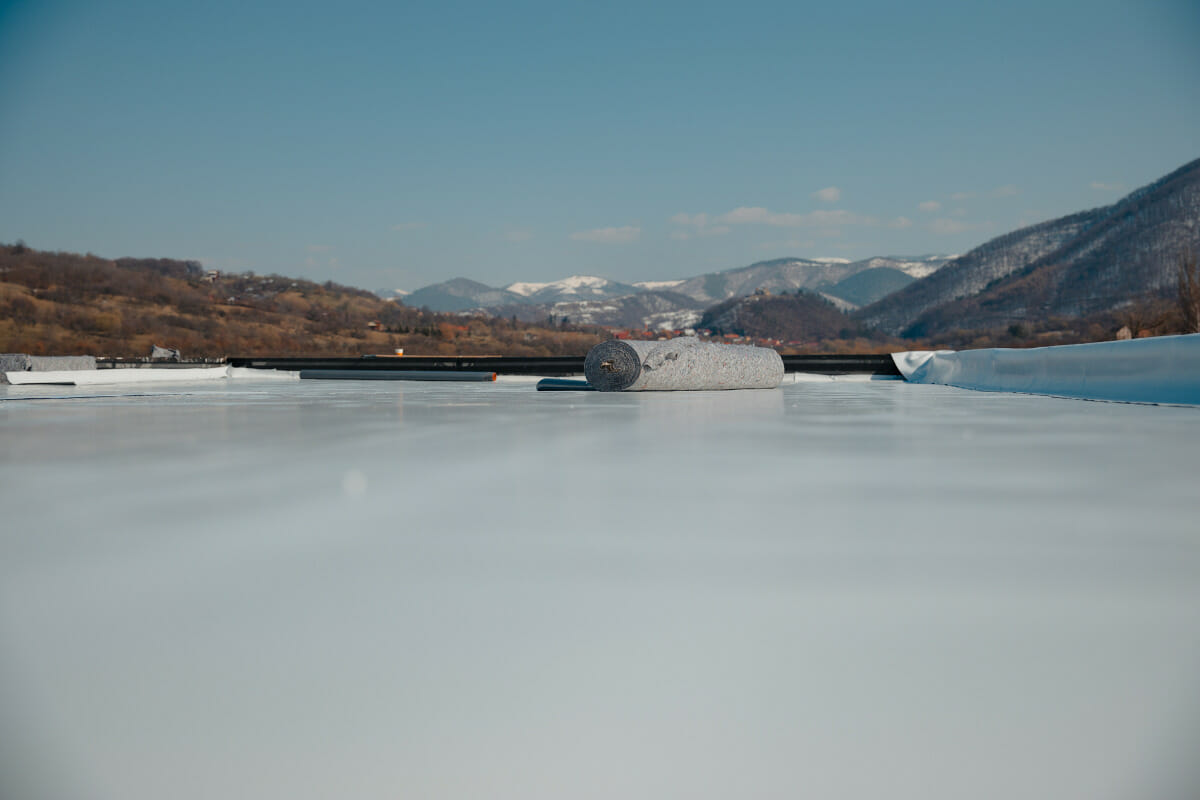
Best Commercial Roof Installation Services In Tampa, FL
Now that you are familiar with the best commercial roofing types, it is time to move ahead and hire a professional roofing contractor to install the roofing system.
SouthShore Roofing & Exteriors is the best commercial roofing company in Tampa. We install the best types of commercial roofs such as EPDM, TPO, and more.
If you have made up your mind on which roofing system will suit your needs, or you want more clarity, you can contact us at (813) 400-3329.
Frequently Asked Questions
What are the different types of commercial roofing systems?
EPDM, TPO, PVC, metal, BUR, and green roofs are common types of commercial roofs. Each offers unique benefits such as durability, weather resistance, and environmental friendliness. Consulting with a roofing professional will help you determine the most suitable option for specific needs and budgets.
What is the average lifespan of each commercial roofing type?
The average lifespan of commercial roofing varies by type. For example, TPO roofs typically last 20 to 30 years, while EPDM roofs can last up to 50 years. Metal roofs have a similar lifespan, but require more maintenance.
Are All Types Of Commercial Roofs Flat?
No, not all types of commercial roofs are flat. While flat roofs are common on commercial buildings, there are other roof types as well. Commercial roofs can include low-slope roofs and pitched roofs.

